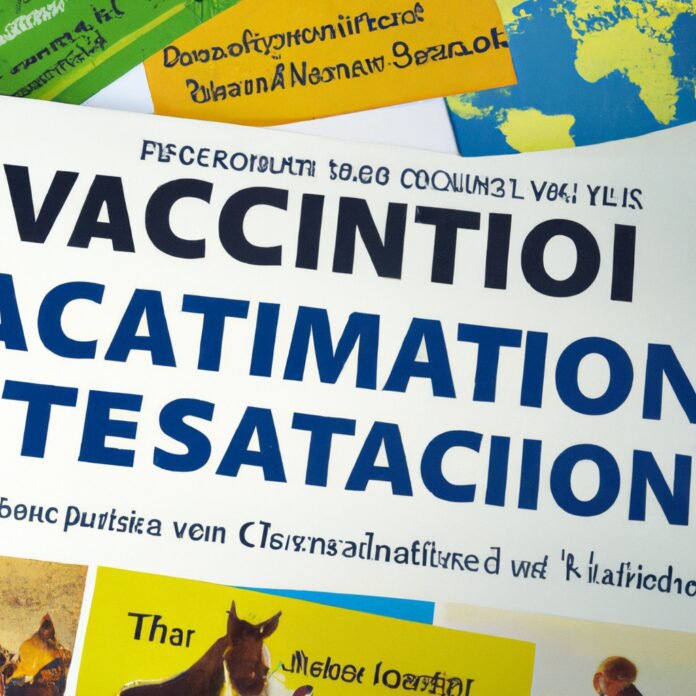Vaccinating yourself and your family is one of the most important steps you can take for staying healthy and protecting the safety of your community. Vaccinations are essential in helping to limit the spread of infectious diseases, and ultimately, in maintaining the health and wellbeing of individuals and of our collective community. The importance of vaccinations requires further discussion, in order to highlight why they’re so vital—for both personal and public health.
1. Safeguarding Health: Why Vaccination Is Key
Vaccines are some of the most efficient tools available to protect your family’s health and well-being. They keep everyone safe by instituting an effective defense against the deadliest of various diseases. Here, we’ll discuss why vaccination is key in safeguarding the health of you and your loved ones:
- Short and long-term protection: Vaccines provide both immediate and long-term protection against many diseases. They enable our bodies to develop immunity against a variety of illnesses, effectively eliminating our risk of being infected.
- Protects vulnerable populations: Vaccination is key in protecting those who are unable to receive the vaccine themselves, such as newborns, the elderly and those with weakened immunity due to medical conditions, or treatments. This decreases their risk of getting sick, and keeps them safe from dangerous diseases.
- Decreases transmission risk: By immunizing a larger percentage of the population, we can decrease a disease’s overall spread and transmission risk. Vaccines reduce the number of people who are capable of transmitting the disease to others, making it harder for it to sustain itself in general.
Vaccines are the most effective way to reduce our risk of getting infected with a variety of health conditions. If you’re interested in protecting yourself and your family from common diseases, be sure to stay up-to-date with the recommended vaccine schedule.
2. Understanding the Science of Vaccines
Vaccines are an amazing invention, with the potential to bring life-saving protection to millions of people worldwide. Since the introduction of vaccines, untold numbers of lives are saved from infectious diseases. But what is truly behind the science of these extraordinary tools?
In general, vaccines help your body develop a resistance to infection by introducing small amounts of an inactive virus, or the surface proteins of the virus, into the body. Your immune system, upon detecting the intruder, produces antibodies to create a protective shield for the body against further infection.
Your visit to the doctor’s often includes a needle prick meant to help your body prepare an immune response against the disease. This is because of the innovation of introducing a weakened version of a virus or bacterial strain, which allows your body to build immunity without having to face any of the serious consequences that more potent strains can bring.
Vaccines come in two types:
- Live vaccines, which contain live attenuated viruses or surface proteins of a virus
- Killed vaccines, which contain an inactive version of the virus or the surface proteins of the virus
The science behind vaccines lies in the fact that they act as a training ground for your body. Your immune system learned how to recognize and fight the virus and create protective antibodies, all without putting your health at risk.
3. Promoting Immunity: Communal Benefits of Vaccination
Vaccination is one of the most effective tools we have to prevent the spread of infectious diseases. Not only does it help keep individuals healthy, but it also has powerful communal benefits of immunization. Here are some of the reasons why it’s so important to ensure everyone in your community is vaccinated.
- Reducing the Potential for Disease Outbreaks: Vaccines help protect entire communities by reducing the risk of infectious disease outbreaks. When immunization rates are high, it makes it more difficult for diseases to spread. This reduces the chances of a single person, or small group of people, infecting a large number of others.
- Mitigating the Risk of Drug-Resistant Germs: When more people are immunized, diseases are less likely to develop resistance to drugs. This is because the germs causing the diseases have fewer opportunities to grow and adapt to drugs, and therefore become more difficult to treat.
- Protecting People Who Can’t be Vaccinated: People who cannot be vaccinated due to serious allergies or weakened immune systems are especially vulnerable. To protect these individuals, it is important that everyone around them is immunized. This will help provide a buffer against the spread of infectious diseases.
By ensuring everyone around us is vaccinated, we can help protect each other and our entire community. Vaccination is the best way to do this, so visit your doctor and get the recommended vaccinations to keep you and your loved ones safe and healthy!
4. Breaking Down Barriers: Accessibility & Affordability
- In order for accessibility and affordability to become a reality, there needs to be an increased commitment to the reduction of financial and societal inequality. It increases the availability and quality of services, and education, for those who are at-risk, and in need of financial assistance.
- Remove roadblocks: We need to break down the barriers to accessing quality services, and education, by removing obstacles like high fees and lack of resources.
Committing to the provision of low-cost and free services and education can help those in need, better access them. A focus should be placed on services and education that are tailored to an individual’s circumstances, and are housed in accessible locations. Additional considerations include the appropriate handling of confidentiality, respect for client wishes and promoting an understanding of a client’s ability to make the best decision for themselves and their family.
By locating services and educational programs in various environments such as local community centres, healthcare facilities, schools, online, etc., there is increased opportunity for individuals to access appropriate services. Additionally, providing access to counseling and financial advisement services can further a person’s ability to become financially, and educationally stable.
Barriers, such as lack of infrastructure, transportation, lack of financial means, disabilities, and language, can be managed through the utilization of technology. By providing self-service portals, digital learning tools, virtual platforms, and access to E-resources, these barriers can be minimized and ultimately removed.
We need to take urgent action to eliminate the disparities created by these barriers and deliver on the promise of accessibility and affordability. Removing these road blocks will help create a more equitable society, empowering individuals to access services and education they need to achieve their goals.
5. Looking Ahead: Securing Our Future Through Vaccination
Vaccination is crucial to securing the future of public health and safety. It’s the best way to protect ourselves and those around us from devastating illnesses. Even more impressive is the potential of vaccines to protect us from strains of illnesses that don’t even exist yet. Looking ahead to the future, vaccination will be our frontline defence against any potential emerging disease.
The Benefits of Vaccination
- Protects the health of individuals and communities
- Lowers the risk of infection and transmission between people
- Reduces the cost of healthcare related to infectious diseases
- Lessens the burden on the healthcare system
Vaccines are safe, cost-effective, and easy to ensure across a variety of settings. Coupled with greater access to information regarding vaccinations, including detailed advisement on how to administer them, vaccinating the population becomes an achievable goal. Scientists and researchers are currently developing preventive vaccines for a range of infectious diseases, with great success.
The Challenges We Face
- Identifying potential obstacles to vaccine access
- Examining the social, ethical, and legal complexities of vaccine policies
- Increasing the public’s awareness of the importance of vaccinations
As attitudes towards vaccines become more positive, we can move ahead with greater plans to ensure efficient and timely delivery of vaccines to the populace. With this, we can ensure a safer future for everyone.
Vaccination is a powerful tool and privilege that many of us have access to. It is essential to take advantage of this privilege to keep those around us safe and to stop the spread of harmful illnesses in our communities. Vaccination is a vital part of our public health system and should remain a top priority. It protects us, our families, and our wider community, so it behooves us all to make sure we stay up to date with our immunizations.

